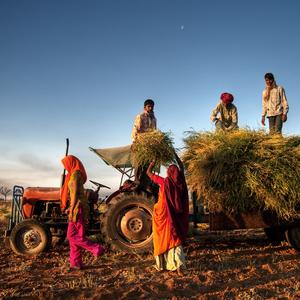Of the many lies spread about Monsanto over the years, perhaps none is so malevolent as the claim that the seed giant is to blame for farmer suicides in India. This falsehood, spread by anti-biotechnology activists like Vandana Shiva but debunked a couple of years ago, is still parroted by credulous left-wing outlets such as Think Progress and supposedly credible news sites like Deutsche Welle1.
Now, a thorough study published in the Journal of Epidemiology and Global Health has concluded that Monsanto's cotton is "unlikely to be an important factor" in the suicides.
The author conducted a qualitative analysis by searching for relevant literature and news stories. He uncovered several key facts:
(1) Farmers in India really are suffering from a suicide epidemic. The suicide rate in India's general population is 11.2 per 100,0002, but for farmers it is 15.8 per 100,000. However, farming is a profession that tends to have a higher suicide rate. In the U.S. in 2012, the "farming, fishing, and forestry" occupational group had the highest suicide rate in the country (approximately 85 per 100,000), nearly six times the rate of its Indian counterpart.
(2) Debt was ranked as the #1 cause of farmer suicides in India.
(3) Farmers with lower yields were more likely to commit suicide than farmers with higher yields. Additionally, farmers who grew "cash crops" (like cotton), which can be financially risky, appear to be more likely to commit suicide than ones who grew food crops.
(4) Despite higher up-front costs, farmers who grew Monsanto's genetically modified cotton (Bt cotton) returned 58% higher profits. There was, though, wide variability in this result. Because of improper cultivation techniques and/or low quality "black market" seeds, not every farmer profited from Bt cotton.
(5) Though the suicide rate among farmers is increasing, it has not kept pace with the much faster rate at which Bt cotton has been adopted.
(6) India has opened itself to greater international competition, driving down the prices farmers receive for their crops. In particular, Indian farmers strongly disliked competing against cotton imported from the United States, which is heavily subsidized. (The U.S. government has subsidized cotton farmers for decades.)
(7) Access to credit and infrastructure (e.g., irrigation) also appeared to play a role in farmer suicides.
Taken together, the author concluded that Bt cotton had little impact on farmer suicides, though it may have played a small role in individual cases.
Despite these facts, anti-GMO demagogues like Vandana Shiva continue to blame Indian farmer suicides on Monsanto. How? Because, according to her, farmer suicides increased after Bt cotton was introduced to the country. Though technically true, that's a logical argument befitting a 3rd grader. It's like saying that roosters cause us to eat breakfast because roosters always crow before we eat breakfast. Just because A precedes B does not mean A causes B.
Unfortunately for battle-hardened anti-GMO activists, Monsanto is being bought out by Bayer, so they will need to identify a new bogeyman. It appears they have found one in Syngenta.
(1) Notably, the "GMO suicide" conspiracy theory was too much even for Tom Philpott, the resident organic foodie at Mother Jones.
(2) For comparison, the CDC reports that, as of October 2016, the overall suicide rate in the U.S. is 13.4 per 100,000.
Source: Dominic Merriott. "Factors associated with the farmer suicide crisis in India." J Epidemiol Glob Health 6 (4): 217-227. Published: December 2016. DOI: http://dx.doi.org/10.1016/j.jegh.2016.03.003




